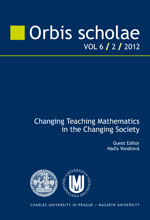Should Learning (Mathematics) at School Aim at Knowledge or at Competences?
Should Learning (Mathematics) at School Aim at Knowledge or at Competences?
Author(s): Stanislav Štěch, Miroslav RendlSubject(s): Essay|Book Review |Scientific Life
Published by: Univerzita Karlova v Praze, Nakladatelství Karolinum
Keywords: knowledge; competence; teaching/learning process; real-world problems; transfer; school reform; reformist discourse
Summary/Abstract: The Czech school reform tends to aim at competences rather than at knowledge. We attempt to bring some evidence that the mathematical competences is a vague term without precise scientific as well as practically useful contents. Based on the analysis of the Czech data from PISA 2003, we could not substantiate the differences in teaching practices referred by students with different mathematics test results, i.e. allegedly with different levels of math competences. Thus, any more or less effective competence-teaching practices could not be identified. Similarly, in TIMSS 2007, we did not find any differences in teaching practices between the Czech “pro-reform” and “antireform” teachers. We further investigated the reformists’ requirement to set up the real life, on the one hand, a starting point of the school teaching/learning, and, on the other hand, its ultimate goal. In the studies exploring the issue, we found no definite results in favour of the use of real-world problems in school mathematics. Similarly, the effectiveness of any particular method or practice of school knowledge acquisition on a far transfer into the everyday or even professional life cannot be proved. Moreover, the usefulness of the concept of transfer itself was questioned in recent debates as redundant (existing besides the concept of learning). We conclude that the Czech reformist discourse is predominantly based on extracting partial moments of the teaching/learning process, putting them as antagonisms and labelling them as universally good or bad. On the contrary, we argue that these different moments, however opposite they could seem, stand as mutually linked parts in the real teaching/learning process.
Journal: Orbis scholae
- Issue Year: 6/2012
- Issue No: 2
- Page Range: 23-39
- Page Count: 17
- Language: English

